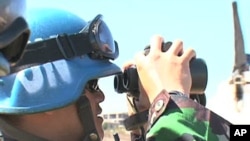Increasing the effectiveness of United Nations peacekeeping is one of the highest priorities for the United States. Multilateral peacekeeping is a cost-effective way to help achieve U.S. strategic and humanitarian interests. But there is room for improvement.
Speaking at the U.N., U.S. Secretary of State Hillary Clinton said, "Too often, despite their ambitious mandates, U.N missions lack key capacities. They don't have enough helicopters, they don’t have enough medic units, they don't have enough police mentors or crisis response tools." Sending out missions without the necessary resources undermines their effectiveness and jeopardizes the safety of U.N. personnel. "So improvement," said Secretary Clinton, "begins with clear, credible and achievable mandates for all U.N. missions."
While the U.S. has, since 2005, facilitated the training of over 118,000 peacekeepers and enabled the deployment of over 110,000 peacekeepers from 19 countries to 19 peacekeeping operations around the world, more is needed. Accordingly, the U.S. supports operational reforms that would enable U.N. field missions to deploy more rapidly, with well-equipped and well-trained troops and police. That's why the U.S. is expanding its efforts to help other countries train and supply formed police units that have the skills and experience to fulfill these missions. These police units would provide a bridge between short-term security operations and long-term work on the rule of law. "There should be special focus on boosting the number of women police officers and peacekeepers," said Secretary Clinton.
One country in particular where U.N. peacekeepers have failed to protect civilian populations is in the Democratic Republic of Congo. Sexual and gender-based violence against civilians has reached unimaginable proportions, said Secretary Clinton. And in spite of the adoption of a resolution to combat sexual violence in conflict zones, no progress has been achieved. Secretary Clinton announced that the U.S. will provide new funding to implement that resolution, including the establishment of the Special Representative's office and ramping up of its efforts to support justice and accountability.
The United States supports U.N. peacekeeping because such missions can contain and resolve conflicts that otherwise would engulf nations and regions. Peacekeepers can help prevent fragile states from becoming failed states and they can help struggling countries start on the road to becoming productive partners.
U.S. Supports U.N. Peacekeepers

Increasing the effectiveness of United Nations peacekeeping is one of the highest priorities for the United States.



